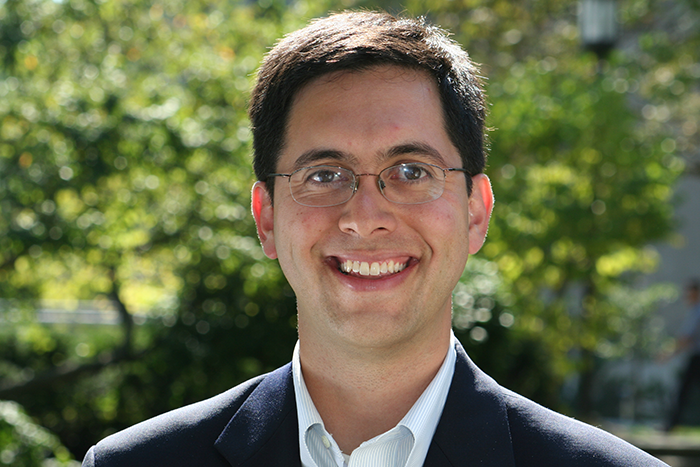Faculty Spotlight: Matthew Notowidigdo
IPR labor economist scrutinizes “overlooked” niches in economics
Get all our news

IPR labor economist Matthew Notowidigdo often kicks off his health economics course with a quote from an infrequently cited academic source, conservative talk show host Rush Limbaugh.
“Health insurance is not supposed to insure your health,” Limbaugh remarked on his radio program in 2009. “It’s supposed to insure your finances.”
Notowidigdo points out that the citation sums up one of his main research streams—studying health insurance’s often overlooked “nonhealth” effects, such as bankruptcy risk and financial strain. “Basically it’s supposed to protect you from financial ruin if you have to go to the hospital,” he said.
Notowidigdo’s scrutiny extends to other “overlooked” niches in economics, examining how different policies might affect a host of employment, health, and financial outcomes. This focus has led him to conducting some novel studies with unanticipated results.
Who pays for the uninsured?
As part of his research on healthcare and personal finance, Notowidigdo has traced how a hospital visit might affect a patient’s credit report, and whether that hinges on having health insurance. Combining hospital records and credit reports for 10,000 consumers, the researchers found that uninsured patients accrue an average of $5,000 in unpaid medical debt in the year following a hospital admission.
“Unsurprisingly, the uninsured are statistically significantly more likely to go bankrupt in a year or two after showing up for treatment at the hospital,” said Notowidigdo.
On the flip side, hospitals are required to provide care even when patients cannot pay. So what happens when hospitals do not receive payment for treating the uninsured?
Using previously confidential financial data, Notowidigdo, IPR associate Craig Garthwaite, and Columbia University’s Tal Gross calculated that each uninsured person costs the treating hospital about $900 per year, thereby increasing their costs and reducing their profits.
The study suggests that hospitals are filling in holes in the U.S. safety net by becoming “insurers of last resort,” and it holds a warning for those states that have not signed on to the Affordable Care Act. The authors estimate that by 2022, the uninsured in these states will rack up $6.4 billion in uncompensated hospital care, with hospitals bearing the brunt of those costs.
The Eight-Month Unemployment Plateau
How does long-term unemployment impact the likelihood of a job applicant receiving a callback? In a series of studies, Notowidigdo and his colleagues examined the relationship between time spent unemployed and the odds of scoring an interview.
Beginning in August 2011, Notowidigdo and his fellow researchers created more than 12,000 mock resumes, using them to apply for more than 3,000 jobs posted online. Each fictional candidate had similar education and work experience, with one key difference—the amount of time spent in the unemployment line, which randomly varied from none to three years.
The researchers found that those unemployed for one month had a 7 percent chance of getting a callback for an interview (the average callback rate hovers between 5-10 percent), while those out of work for 8 months had just a 4 percent chance. Even more interesting, the rate plateaus at 4 percent for those who remain jobless beyond 8 months—meaning after 8 months, employers are less likely to view stretches of unemployment as indicative of a candidate’s quality.
This finding, which confirmed that, up to a certain point, employers do screen out applicants with longer jobless spells, was especially troubling in the wake of job losses generated by the Great Recession.
“At one point, the [Obama] administration was very concerned about the fact that the share of the people who were unemployed for six months or more was extremely high by historic standards,” Notowidigdo recalled.
Their study generated a lot of press, and President Barack Obama even referenced the study at a White House summit in February 2014.
Can food stamps affect family finances?
For his latest project, Notowidigdo is trying to unpack why someone who is eligible for the Supplemental Nutrition Assistance Program (SNAP)—formerly known as the food stamp program— might not sign up to receive it.
Notowidigdo and his colleagues venture several reasons why people might not sign up to receive benefits, ranging from not wanting to fill out the paperwork and being unaware of the program or of their eligibility to wanting to avoid the stigma associated with using food stamps.
To explore why, the researchers are conducting an experiment that involves sending letters to thousands of SNAP-eligible Pennsylvanians. Some letters will provide information about eligibility, while others will provide more information about the program. Another group of letters will address the issue of stigma surrounding the program. The researchers hope to answer two key questions: Which letter will be most effective in getting people to sign up for benefits, and what types of people respond to the letters?
If enough people sign up for food stamp benefits through this study, Notowidigdo hopes to follow them and examine food stamps and financial security—for instance, does receiving food stamps reduce a family’s financial strain or help them pay their bills?
“There are 40 million Americans receiving food stamps, and we don’t really know what we’re getting for that,” Notowidigdo explained. “What’s really cool about this study is...you can use that data to study the effect of food stamps on other outcomes, which we know surprisingly little about.”
Matthew Notowidigdo is associate professor of economics and an IPR fellow.
Published: March 16, 2016.